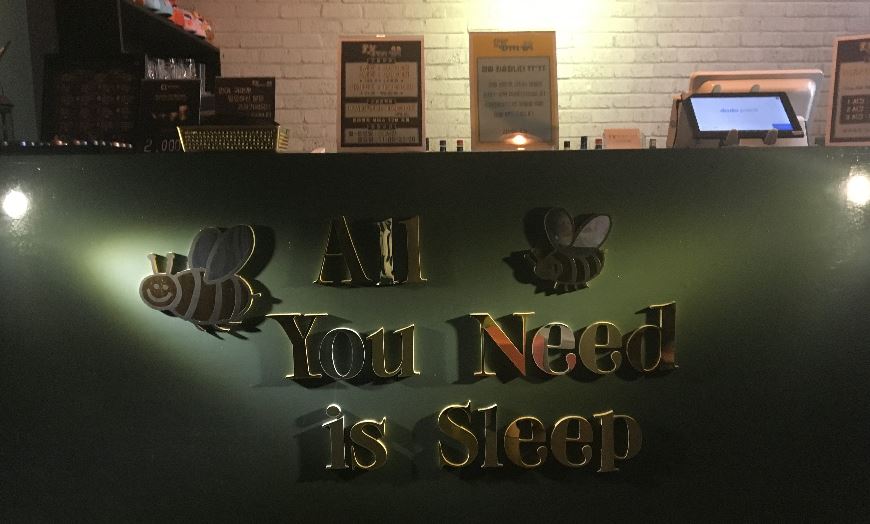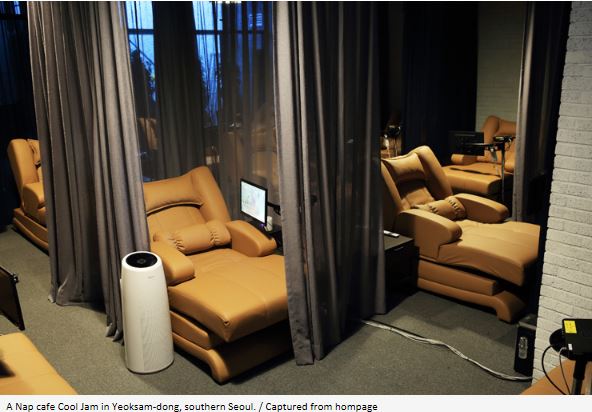[UK_Quartz] Time-stretched Koreans are turning to fast healing to fix their minds and bodies
Time-stretched Koreans are turning to “fast healing” to fix their minds and bodies
Quartz October 2, 2017 Seoul, South Korea
See the Original(Click Here)
All the napping pods were already full shortly after noon at one nap cafe in Seoul’s business district of Gangnam on a recent weekday. Some customers, recharged from their naps, hung out in a common area equipped with bean bags, board games, and acoustic guitars while sipping iced coffee.
Jung Woon-mo, 59, opened Shim Story-which calls itself a “public convenience lounge”-in 2015, when he realized that stressed out and exhausted Koreans had few public parks or other resting areas to go to during their lunch hours in the capital. Customers, who also include tired students looking for some downtime before going to tutoring sessions, pay 7,000 won ($6.20) to nap for an hour with a drink included.
A napping pod in Shim Story.
The growing popularity of nap cafes in the country is part of a growing industry known as “fast healing,” as tired but time-poor Koreans look for quick fixes to soothe not only their bodies, but also their minds. It’s an industry that encompasses everything from massage chairs to yoga to mattresses-the word “sleeponomics” is used to describe the rapidly growing industry servicing Korea’s sleep deprived. A “healing fair” (link in Korean) held earlier this year in Seoul had over 300 booths selling “healing” products, as well as activities including group yoga, ornament-making classes, and seminars, including one titled “The solution to brain fatigue that makes a happy life.”
Office workers are so desperate for some shut-eye that one cinema in Yeouido, a business district in Seoul, was offering a nap service called “Siesta” (link in Korean) during lunch hours, priced at 10,000 won ($8.80) for an hour and a half.
Getting more rest has been part of president Moon Jae-in’s message. He promised to take all of his allotted 21 days of paid leave this year to set a good example for people-though he didn’t seem to set a very good example of work-life balance, as his first trip was to the city of Pyeongchang, where the winter Olympics will be held next year, in order to draw more attention to the venue.
A massage chair in Cool Jam.
An OECD ranking of 39 countries for 2016 put South Korea in the No. 3 spot for working hours (after Mexico and Cost Rica), with an average annual number of 2,069 hours. A recent survey found that almost half of Korean workers have less than five days of vacation a year.
Moon has pledged to reduce working hours to about 1,800 hours a year, partly in order to increase jobs. Working hours went down after Korea began shifting from a six-day to a five-day work week over a decade ago but that trend has stalled, and one in five employees still works more than 54 hours a week.
To give Koreans more R&R time, the government designated Oct. 2 (Monday) as a one-off temporary holiday this year. That day bridges the major Chuseok holiday, which falls towards the end of next week, as well as National Foundation Day and Hangul Day (which celebrates Korea’s writing system), giving Koreans the period between Sept. 30 and Oct. 9 off. Tensions on the Korean peninsula were another reason for the break-the president said that he hopes that amid a “grave security situation,” “the holiday will serve as a time of rest and comfort for the public.” It’s also a way to boost the sluggish economy, in particular the hospitality sector, which has suffered from a severe Chinese boycott over geopolitical tensions.
Moon himself, his aides noted, is dealing with North Korean tensions in a “measured manner” by taking his dog out for a walk in the mountains one weekend this month.
Some Koreans, though, are using the long break to study even more. A number of hagwon, or the ubiquitous tutoring schools attended by many Korean students, are offering special classes over the holiday, according to local media reports, ahead of middle school mid-terms, and the all-important college entrance exam in November.
And even those who try to rest don’t seem to know how to do it.
At another nap cafe in Gangnam called Cool Jam, customers lie on reclining massage chairs in pods separated by curtains, and can also order beers. Bae Bum-chan, 45, who operates the lounge, said there was one major reason why despite the amenities on offer, many Koreans are still unable to switch off: “A lot of people lie on the chairs looking at their phones.”
Vincent Choi contributed reporting.
This article was originally published in Quartz. (https://tribunecontentagency.com/article/time-stretched-koreans-are-turning-to-fast-healing-to-fix-their-minds-and-bodies/)
Relate articles:

